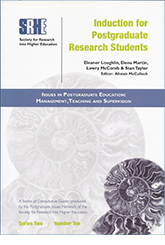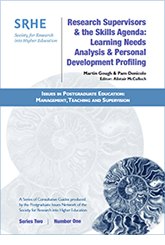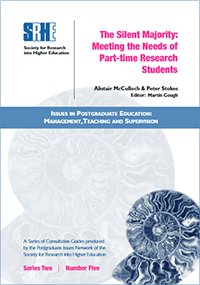
Published by:
SRHE and the SRHE Postgraduate Issues Network.
New series of SRHE Postgraduate Guides
The SRHE Postgraduate Guides have proved a very popular series and meet a growing demand for advice and guidance on the practical issues involved in the management, teaching and supervision of postgraduates who come from a great variety of disciplines and backgrounds, often with widely different needs.
A new series of Issues in Postgraduate Education Management, Teaching and Supervision was launched in July 2008. The first eight titles, shown below, are currently available and can be ordered directly from the Society. New titles are added each year on a rolling programme.
The Guides, which are developed by the SRHE Postgraduate Issues Network, are designed to be clear, practical and devoid of jargon. They are written by individuals with first hand experience of the issues as well established research credentials and go through a rigorous editing. These Guides form a valuable set of tools that will help deliver and support the delivery of high quality postgraduate training.
RESEARCH SUPERVISION AND THE SKILLS AGENDA:
LEARNING NEEDS ANALYSIS AND PERSONAL DEVELOPMENT PROFILING
Martin Gough and Pam Denicolo
Series Two, Number One
Both Learning Needs Analysis and Personal Development Profiling are relatively new in postgraduate research. Together they offer powerful tools in ensuring appropriate development and training and, in an increasingly audit-driven society, a way of evidencing that development.
The first part of this thought-provoking Guide outlines Learning Needs Analysis and Personal Development Profiling and provides suggestions for their implementation. The second summarises national policy developments and their implications. In the third part, the authors develop positive arguments for embracing the skills agenda rather than merely complying with dictats from above.
This Guide is aimed not only at supervisors, institutional managers and policy makers, but also at novice researchers themselves. By raising awareness of skills and personal development processes, common understandings between supervisors and novice researchers can be facilitated, to the benefit of the individual and the research.
A GUIDE FOR INTERNAL AND EXTERNAL PhD EXAMINERS
Carolyn Jackson and Penny Tinkler
Series Two, Number Two
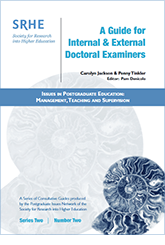
Dr Peter Stokes, Department of Strategy and Innovation, University of Central Lancashire
SUPERVISING DISABLED RESEARCH STUDENTS
Val Farrar and Richard Young
Series Two, Number Three
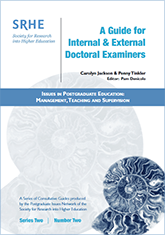
Janet Metcalfe, Director, UK GRAD
SUPERVISING INTERNATIONAL RESEARCH STUDENTS
Second Edition
Eunice Okorocha
Series Two, Number Four
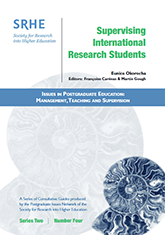
Martin Gough and Françoise Carénas, Guide editors
THE SILENT MAJORITY: MEETING THE NEEDS OF PART-TIME RESEARCH STUDENTS
Alistair McCulloch and Peter Stokes
Series Two, Number Five
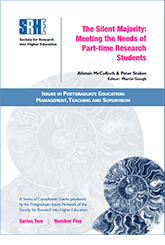
Professor Gareth Parry, School of Education, University of Sheffield
SUPERVISION TEAMS: MAKING THEM WORK
Anne Lee
Series Two, Number Six
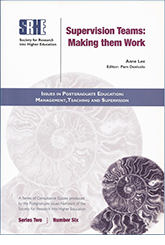
Professor Diana Woodward, The Graduate School, Napier University, Edinburgh
EVALUATING TRAINING AND DEVELOPMENT PROGRAMMES FOR POSTGRADUATE AND NEWER RESEARCHERS
Tony Bromley
Series Two, Number Seven
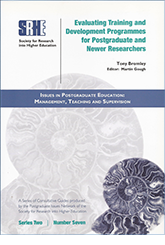
Evaluation can appear a daunting and complex task and raises many issues, for example, in how we can demonstrate the influence of a training activity on a particular outcome. This Guide is to be commended in not shirking such difficult issues, exploring opportunities for solutions and guiding the reader through evaluation methodology.”
Dr Iain Cameron, Head, Research Careers and Diversity Research Councils UK
THE BOLOGNA PROCESS AND BEYOND: IMPLICATIONS FOR POSTGRADUATE EDUCATION
Tony Fell & Ian Haines
Series Two, Number Eight
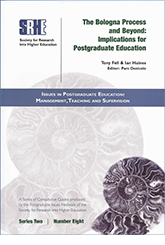
Professor Pam Denicolo, Vice Chair UKCGE, Member of the Rugby Team – a national sector working group evaluating the impact of researcher training and development, University of Reading
CAPTURING BEST PRACTICE IN POSTGRADUATE SUPERVISION – TAKING A FRESH LOOK
Alan Rousseau & Adrian Eley
Series Two, Number Nine
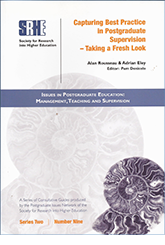
INDUCTION FOR POSTGRADUATE RESEARCH STUDENTS
Eleanor Loughlin, Elena Martin, Lowry McComb, & Stan Taylor
Series Two, Number Ten
